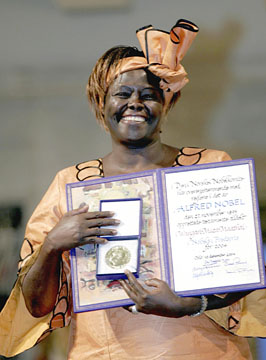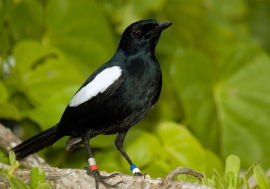Africa Watch
GLOBAL SECURITY
Report highlights 21st century threats
To kick off an international debate on the world's new and evolving security threats, UN Secretary-General Kofi Annan submitted a much-anticipated report to the General Assembly on 2 December. "I wholly endorse its core arguments for a broader, more comprehensive system of collective security," he said of the report, A More Secure World, produced by a high-level panel he appointed in 2003.
The report covers a broad range of issues, such as the need for a comprehensive strategy against terrorism, the rules governing the use of force, nuclear proliferation, rebuilding public health systems, combating poverty and reforming the UN Security Council to make it more representative and pro-active. "We cannot treat issues such as terrorism or civil wars or extreme poverty in isolation," the Secretary-General said.
The 16-member panel, headed by the former prime minister of Thailand, Mr. Anand Panyarachun, also included three members from Africa: Ms. Mary Chinery-Hesse of Ghana, Mr. Amre Moussa of Egypt and Mr. Salim Ahmed Salim of Tanzania. As part of his efforts to stimulate debate and reflection on the report's 101 recommendations, Mr. Annan briefed the General Assembly's Africa Group on 13 December. The full text of the report is available at the website <www.un.org/secureworld/>.
GREAT LAKES
Leaders pledge cooperation for peace
Eleven heads of state and government in Africa's war-torn Great Lakes region have vowed to strengthen regional cooperation for peace. In a declaration adopted at the conclusion of the first summit of the International Conference on Peace, Security, Democracy and Development in the Great Lakes Region, held 19-20 November in Dar-es-Salaam, Tanzania, the leaders reaffirmed a "regional and inclusive vision" for promoting sustainable peace, security and democracy. They pledged to crack down on cross-border arms trafficking and increase security cooperation against insurgent groups.
Held under the auspices of the UN and the African Union, the summit drew the leaders of Angola, Burundi, Central African Republic, Republic of Congo, Democratic Republic of Congo, Kenya, Rwanda, Sudan, Tanzania, Uganda and Zambia. Another half-dozen African heads of state attended as "witnesses."
The participants agreed to improve governance and respect for human rights, strengthen regional action to combat HIV/AIDs and other diseases and "build a unified economic space" for poverty alleviation and development in line with the African economic blueprint, the New Partnership for Africa's Development (NEPAD). The leaders declared the Great Lakes region a "specific reconstruction and development area" and pledged to seek increased donor support for peacebuilding and reconstruction programmes. Amid signs that regional peace agreements remain dangerously fragile, the leaders agreed to establish an inter-ministerial committee to implement the agreed decisions and to prepare for another meeting in 2005, in Nairobi, Kenya.
Kenyan environmentalist awarded Nobel Peace Prize
Declaring that "sustainable development, democracy and peace are indivisible," the noted Kenyan environmentalist, women's rights and democracy activist, Ms. Wangari Maathai, accepted the 2004 Nobel Peace Prize in Oslo, Norway, on 10 December, International Human Rights Day. "As the first African woman to receive this prize, I accept it on behalf of the people of Kenya and Africa, and indeed the world," she said. "Although this prize comes to me, it acknowledges the work of countless individuals and groups across the globe. They work quietly and often without recognition to protect the environment, promote democracy, defend human rights and ensure equality between women and men. In so doing they plant seeds of peace."

The first African woman in Kenya to earn a doctorate, the 64-year-old biologist gained international recognition in 1977 when she founded the Green Belt Movement to combat endemic deforestation and soil erosion. Nearly three decades and 30 mn trees later, the movement has transformed the Kenyan landscape and mobilized tens of thousands of people - mostly poor women - to protect the environment and become more active in economic, social and political life.
Although Ms. Maathai avoided politics at first, it soon became clear, she observed, that "responsible governance of the environment was impossible without democratic space." Her political activism soon brought her into conflict with the government of former President Daniel arap Moi - frequently landing her in jail and making her the target of official harassment and abuse.
Instead of silencing her, however, the authorities transformed her into a leader of the pro-democracy movement - which used a tree as its symbol. By linking struggles for environmental justice, democracy and rights, she said, thousands of ordinary Kenyans "learned to overcome fear and a sense of helplessness and moved to defend democratic rights."
Ms. Maathai's integration of environmental and human rights concerns was cited by the Nobel awards committee as a key factor in selecting her for the $1.48 mn prize. "Peace on earth depends on our ability to secure our living environment," the committee noted. "Maathai stands at the front of the fight to promote ecologically viable social, economic and cultural development in Kenya and in Africa. She has taken a holistic approach to sustainable development that embraces democracy, human rights and women's rights in particular. She thinks globally and acts locally."
Ms. Maathai is one of only seven Africans and 12 women to receive the peace prize in its 103-year history. Ms. Maathai was elected to the Kenyan parliament in 2002 and currently serves as the country's assistant minister for environment, natural resources and wildlife.













